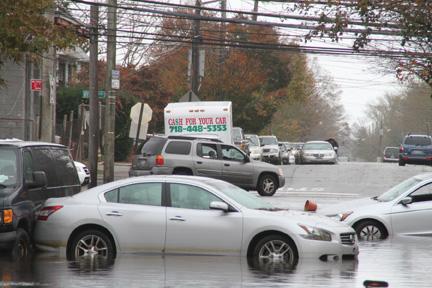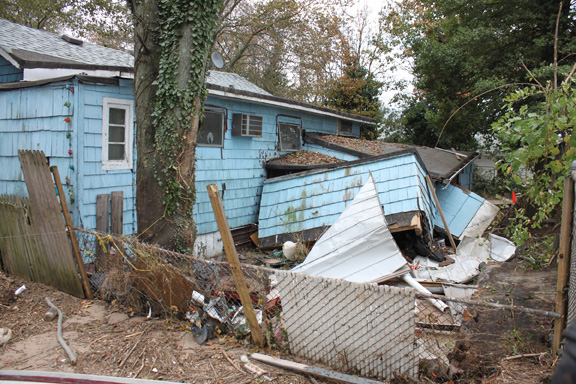“A 30-foot wave washed over my house,” says Erin Summer Moulton, a photographer who lived with her wife, Christine, in Midland Beach, Staten Island. When Superstorm Sandy made landfall on October 29, the two women fled inland, to a relative’s house 10 minutes away. When Moulton was able to return to her own home a few days later, she found the one-story house standing at a crazy angle, a dirty water line visible about five feet high on her living room’s walls. The refrigerator lay on its back in the middle of the kitchen, blocking the back door. She says sewage, debris and trash coated the floors. “I want to say I don’t cry ‘cause I’m butch, but that’s a lie.”
Moulton tells GO that most of the supplies in her stricken neighborhood have come from neighbors rather than the Red Cross, FEMA or other major organizations. Local residents and churches have set up makeshift drop-off locations for donations—and have welcomed affected families regardless of sexual orientation, including hers, as they try to rebuild their lives. Now, Moulton and her wife are sleeping at Christine’s grandmother’s house just a short drive from her destroyed home. “I do realize how lucky I am to have family to stay with when so many other people, especially gay families, don’t,” she says.
Moulton’s experience is echoed across New York City’s LGBT community. Sandy has hit LGBT people, a vulnerable population in the best of times, from every angle. The storm has strained family ties and resources, and LGBT New Yorkers with tenuous support from family and community have suffered accordingly.
Nonprofit organizations that provide food, clothing and health services to LGBT youth lost thousands of dollars in inventory as demand skyrocketed. Floodwaters destroyed the Ali Forney Center’s drop-in facility in Chelsea, a crucial resource for LGBT homeless youth seeking hot meals, clean clothes and toiletries. The Hetrick-Martin Institute (HMI), the world’s largest provider of hot meals for LGBT youth (as well as other needed services), saw $10,000 worth of food and supplies spoiled when the electricity went out for six full days.
“LGBT youth have not felt safe or comfortable at a lot of the shelters and services set up post-Sandy,” explained Thomas Krever, executive director of HMI. “Shelters may not have the wherewithal to house gay or transgender young people, who are already disconnected from family and support. The storm really drove home that sense of alienation and exclusion from resources.”
Other groups were forced to cancel or downsize annual fundraisers that typically generated a significant portion of their annual operating budgets, including HMI, the AIDS Service Center of NYC and Gay Men’s Health Crisis. Lesbian bars and nightlife promoters lost revenue from revelers on Halloween, one of the biggest nights in the LGBT party calendar, when downtown bars and clubs were plunged into the dark.
Losing business from her Halloween event and the week following “was a major financial hit,” says Whitney Day, the DJ and promoter. “I had invested money into the party, so I ended up in the red. I also lost all of my other DJ gigs during that time due to the effects of Sandy on the venues and transportation. Although it hurt my wallet, others were clearly far more affected by the storm than I. As a promoter, I’m learning there is always a financial risk involved—that’s just the business—but there are things money can’t replace.”
Realizing that their friends or colleagues suffered incalculable losses is encouraging members of LGBT community to come together for storm relief. HMI’s Krever says the overall response to the organization’s Superstorm Sandy Relief Fund “has been phenomenal,” raising more than $50,000 to replace basic supplies for the most at-risk youth, including young people beginning to show signs of post-traumatic stress disorder. The group produced a scaled-down 2012 Emery Awards celebration to thank donors on December 11.
Lesbian-owned small businesses are also pitching in despite their own losses. Lisa Graziano of venerable lesbian bar Henrietta Hudson is grateful that the building emerged from the storm unscathed, though floodwaters crested only a block away, and some employees lost cars and property. Loyal patrons have donated cash and supplies at the bar to benefit Occupy Sandy, the grassroots relief effort. Graziano herself has driven five carloads of goods to affected communities in Staten Island.
“Gays and lesbians come from an ‘activist’ family; we’re the ones who jump in to donate and speak out about hardships,” Graziano says. The bar is planning a benefit event for January with the goal of raising $10,000 for Occupy Sandy. “The dedication is there—but people still don’t know the extent of the devastation. What I’ve seen firsthand will take a long time to repair. People need to keep their neighbors in mind, and have compassion for others. People are still recovering.”
Moulton, the Staten Island resident, would like to see more gay and lesbian people involved in helping their brothers and sisters in the hardest-hit areas of the city. She hopes more people will venture to the zones of destruction and lend a hand or a shoulder to cry on.
—
Help LGBT New Yorkers by making a monetary donation at hmi.org/donate.



What Do You Think?